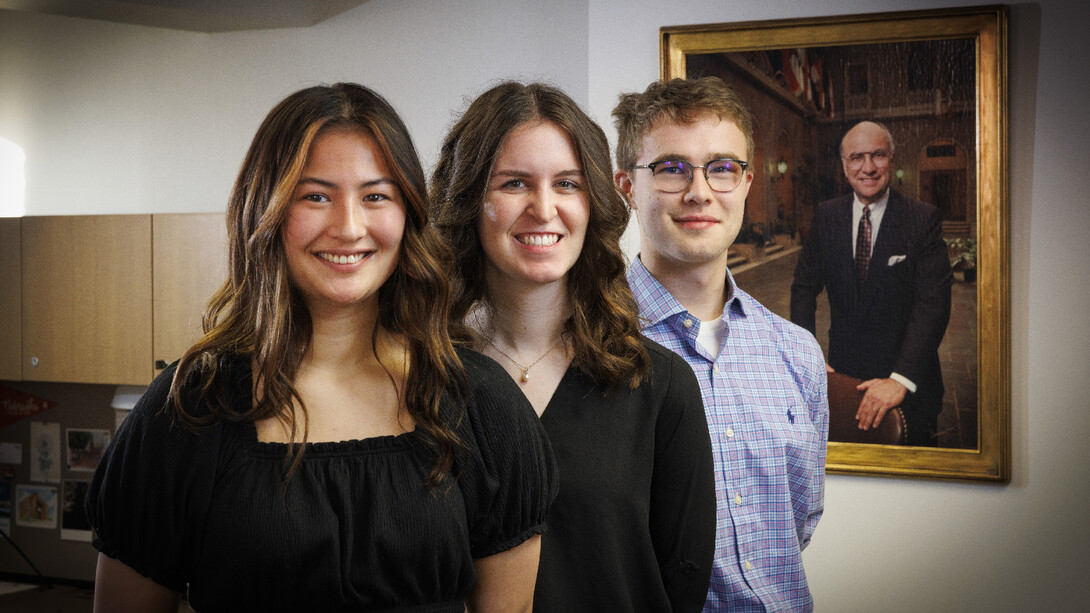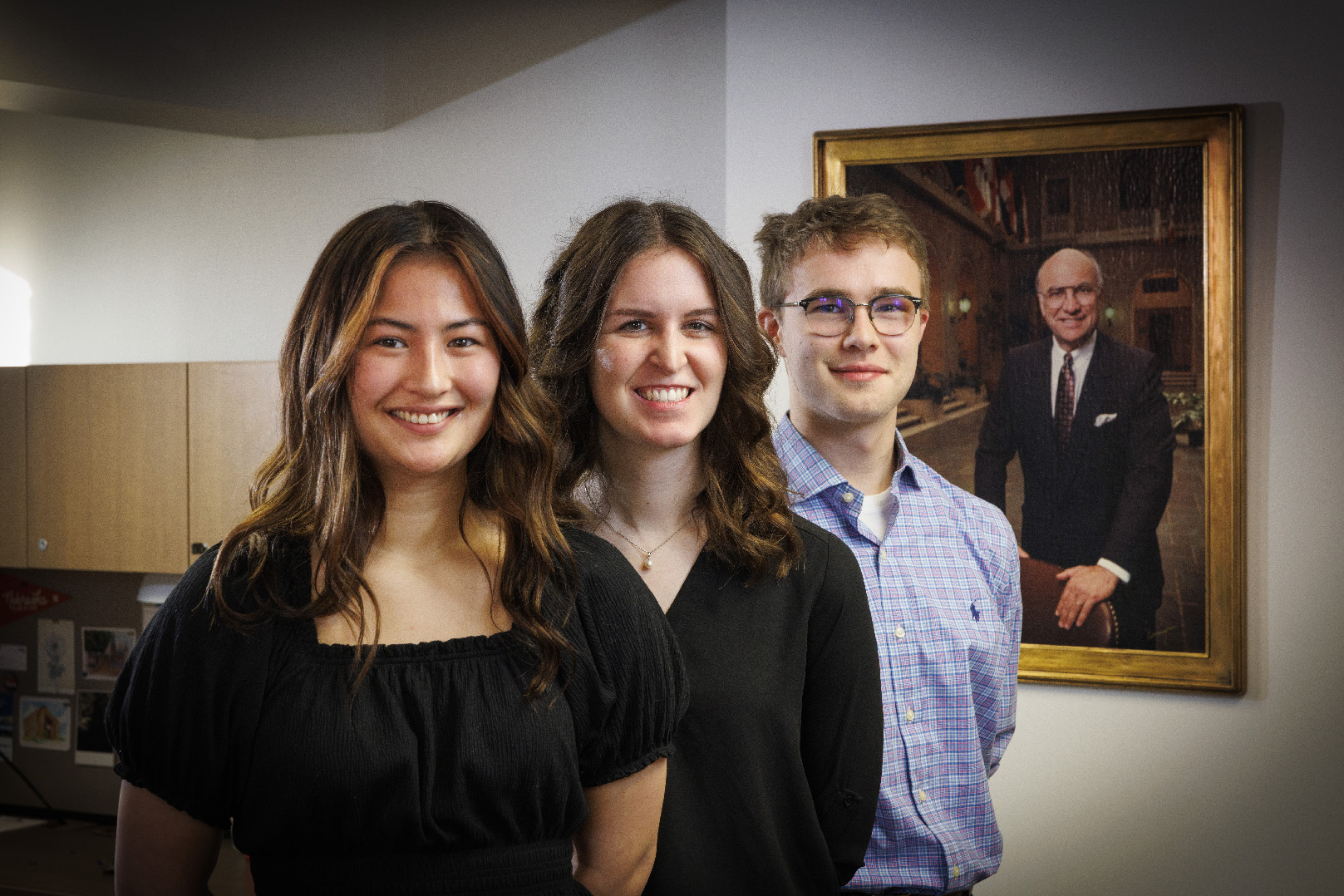
“It’s eye-opening,” Victoria Diersen, a Husker senior economics major, said of the important discovery she’s made thanks to the Clayton Yeutter Institute of International Trade and Finance.
The discovery? Once you begin to study international trade, you find it requires an understanding not only of economics, but additional disciplines — law, business, agriculture, science, geography, policymaking and politics.
That demonstrates the value for students in pursuing the Yeutter Institute’s international trade minor, she said. The minor is especially rewarding, she said, in the way it broadens one’s knowledge and strengthens one’s analytical ability.
Economics textbooks provide a good start, said Diersen, a South Dakota native, but with the international trade minor, “you really begin to build out your understanding and look at things from multiple angles. You really see how important international trade is from every aspect.”
The Yeutter Institute began the minor last fall and will host student events during the week of Feb. 19 to help students learn about it. (Details are below.)
Diersen, who will begin work as an analyst with the investment bank Goldman Sachs after graduation, is one of seven students who so far have added the trade minor to their academic resume. The minor is open to all Husker students, regardless of their major.
Jill O’Donnell, the institute’s Haggart-Work Director, and Cheyenne Gerlach, assistant director, work flexibly with students so that relevant course work in a variety of departments can often count toward the international trade minor. Paired with a core curriculum the Yeutter Institute has developed, students gain baseline trade knowledge and skills they can then tie to their major field of study.
“It’s incredibly welcoming to students from every different kind of background,” said Zane Mrozla-Mindrup, a junior agricultural economics major from Louisville, Nebraska, who graduated from Gretna High School.
The experience of Kyoko Wall, a senior economics major from St. Louis, provides an example.
Wall received credit in the minor for trade analysis she did during her internship with the Department of English’s African Poetry Book Fund. As part of her work, Wall studied trade obstacles that African authors face. She similarly received credit for her study abroad at the University of Ghana.
Wall, who is also pursuing minors in statistics and business analytics, was grateful the Yeutter Institute provided flexibility for her to pursue the trade minor during her senior year.
“I like how encapsulating it is,” she said, in encompassing such a broad range of academic disciplines. “The minor does a really good job of letting you discover all those other paths.”
Such a breadth of understanding is fundamental to studying trade issues.
“The world needs people who understand agriculture, business, supply chains, digital technologies and diplomacy and can relate those areas to trade,” O’Donnell said. “This minor allows students in any major to connect their field to trade.”
In-class simulations, such as mock congressional hearings, are a key component of the Yeutter Institute’s approach, providing experiences that help students understand real-world policy deliberations and complexities. The program also provides mini-courses and presentations from a range of trade experts.
A mini-course taught by Stephen Olson, an expert in Asian trade issues, on U.S.-China trade relations was “one of the most eye-opening courses I’ve had,” Diersen said. “It helped me look at trade as a whole entirely differently” by explaining real-world situations and expanding the breadth of study to include inter-Asian trade and Latin American trade connections.
The trade minor “equips students to ask questions so they can articulate what is at stake and offers them real opportunities to propose solutions,” O’Donnell said. “This will give them an edge as they enter careers that will coincide with the generational challenge of helping the system adjust during this period of flux.”
Mrozla-Mindrup, a Cass County native whose study of agricultural economics has a public policy focus, said he appreciates how the study of trade relates so closely to Nebraska’s agricultural economy.
“The trade minor has helped me apply complex concepts and connect them back to the real-world issues that I see in my hometown,” said Mrozla-Mindrup, a teaching assistant for the Department of Agricultural Economics’ introductory course on international trade in agriculture.
He credited O’Donnell’s course on international trade policymaking, required for the minor, for “giving students a baseline where you can get all the underlying skills to evaluate policy and learn about the laws that guide trade policy.”
“There are so many layers on this issue,” Diersen said. “You can’t go a single day without being affected by the implications of global trade.”
Events planned Feb. 19-23
The Yeutter Institute will host a series of student events the week of Feb. 19 to explain the minor to students across campus.
- Monday, Feb. 19: Husker Trade Talk on opportunities in trade for communications professionals at 9:30 a.m. in Andersen Hall 114. Students can register here.
- Tuesday, Feb. 20: Special public lecture on trade featuring U.S. Rep. Adrian Smith of Nebraska’s 3rd Congressional District at 5 p.m. in Great Plains Room C in the Nebraska East Union.
- Wednesday, Feb. 21, and Thursday, Feb. 22: O’Donnell and Gerlach will visit numerous classes on City and East campuses.
- Friday, Feb. 23: Drop-in advising hours from 10 a.m. to 3 p.m. in the Yeutter Institute office, Room 4, Agricultural Communications Building, East Campus. No appointment is necessary.








